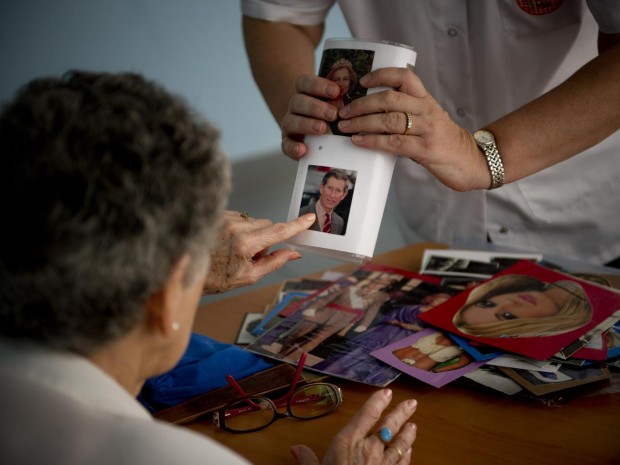Shockingly enough, Alzheimer is contagious and can be transmitted

The Independent
The controversial theory that the “seeds” of Alzheimer’s disease may have been transmitted between patients during surgical procedures involving the use of donated human tissue has been supported by the discovery of new evidence.
Scientists have found a link between patients who received nerve-tissue grafts several decades ago and the presence of a protein in the brain that is normally seen in the earliest stages of Alzheimer’s disease.
The study supports findings published last September suggesting that people who had been injected with human growth hormone when they were children were harbouring the same seeds of Alzheimer’s disease at the time of their death several decades later.
The latest study was carried out on the stored brain samples of eight patients who had undergone tissue grafts in Austria and Switzerland but who had died from another brain disease, Creutzfeldt-Jakob disease (CJD), which is now known to have been transmitted during the operation involving nerve tissue taken from human cadavers.
The retrospective analysis of the eight patients found that seven of them, who had died at ages ranging from 28 to 63, had clumps of protein in their brain called amyloid-beta (A-beta). This is seen in the early stages of Alzheimer’s but is highly unusual in such a relatively young age group.
Five of the seven patients had also suffered visible damage to the vital blood vessels of the brain caused by the build-up of A-beta protein – an observation that is also highly unusual in such a young age group.
A control group of 21 brains from patients who had died of sporadic CJD indicated that the results were not the result of CJD but likely to be caused by the tissue graft.
Other possible causes have yet to be conclusively eliminated. But scientists suspect that the seeds of the A-beta protein may have been transmitted to the patients at the time they had a surgical graft of the dura mater, a membrane that covers the brain and spinal cord – which at that time came from cadavers, before the practice was stopped in the 1980s.
The findings support the view that it may be possible for certain medical procedures to inadvertently transmit the seeds of Alzheimer’s disease from one person to another – although there is no suggestion that Alzheimer’s can be “caught” by touching or caring for someone with the degenerative brain disease.
“The presence of the A-beta pathology in young individuals is highly unusual and suggests a causal relationship to the dural grafts,” according to the study by scientists from the University Hospital Zurich and the Medical University of Vienna, led by Herbert Budka of the Institute of Neuropathology in Zurich.
“The growing circumstantial evidence for such transmission should prompt a critical re-evaluation of the decontamination procedure for surgical instruments and drugs of biological origin, with the goal to ensure the complete absence of potentially transmissible contaminants.”
A study last year found that a small group of people who had been injected when they were children with human growth hormone prepared from human cadavers, and who had died of CJD as a result, also had A-beta protein in their brains.
Professor John Collinge, head of neurodegenerative diseases at University College London, said at the time that the growth hormone findings suggested that there may be another route to developing Alzheimer’s via contaminated surgical instrument or medical products.
“What we need to consider is that in addition to there being sporadic Alzheimer’s disease and inherited, or familial, Alzheimer’s disease, there could also be acquired forms of Alzheimer’s disease,” Professor Collinge had said then.
On 29 January, he said the latest findings support the hypothesis that protein seeds leading to Alzheimer’s disease may be transmissible from one person to another during invasive medical procedures such as tissue grafts and hormone injections. “The find is consistent with our own,” he said.
“The fact that this is a completely different situation that is nothing to do with growth hormone or growth deficiency, but in people who had to have a surgical procedure and we are seeing the same thing is consistent with our hypothesis that this represents transmission of A-beta seeds to these individuals.”
He added: “If there are risks, one would expect them to be related to surgical procedures involving brain tissue and those are relatively rare procedures. Scientists should be thinking about this and whether it is possible to transmit these proteopathic seeds by medical procedures.”
Last September, the Governments’s Chief Medical Officer, Dame Sally Davies, said: “There is no evidence that Alzheimer’s disease can be transmitted in humans, nor is there any evidence that Alzheimer’s disease can be transmitted through any medical procedure”.
How to submit an Op-Ed: Libyan Express accepts opinion articles on a wide range of topics. Submissions may be sent to oped@libyanexpress.com. Please include ‘Op-Ed’ in the subject line.
- France’s Libyan Conundrum: From Key Player to Spectator - January 11, 2025
- Sudan’s Child Crisis Reaches Breaking Point, UN Warns - January 11, 2025
- Libya electoral body reviews reform proposals - January 11, 2025


